The Boston Region Metropolitan Planning Organization 2022

The PEP Guidebook
Your Guide to the Boston Region MPO’s Public Engagement Program
Are you a community leader, advocate, elected official, town planner, or individual who wants to learn more about how to engage in the regional transportation planning process? Then this guide is for you.
In this guide
The Boston Region MPO’s Public Engagement Program (PEP)
The Boston Region MPO members
The purpose of MPOs
Opportunities to engage in the planning process
The MPO’s public engagement principles
The history of MPOs
What is the MPO’s Public Engagement Program?
The Boston Region Metropolitan Organization’s (MPO) Public Engagement Program (PEP) is the MPO’s strategy to include all people in Boston’s regional transportation planning process. The program strives to ensure that all members of the public are given the opportunity to participate, including populations that have been underserved by the transportation system and lacked access to the decision-making process. The PEP guides the MPO’s efforts to offer continuous and meaningful opportunities for members of the public to influence and shape transportation decision-making in the region. The PEP covers all outreach activities from MPO meetings to in-person and online forums, digital communications, and pop-up engagement events.
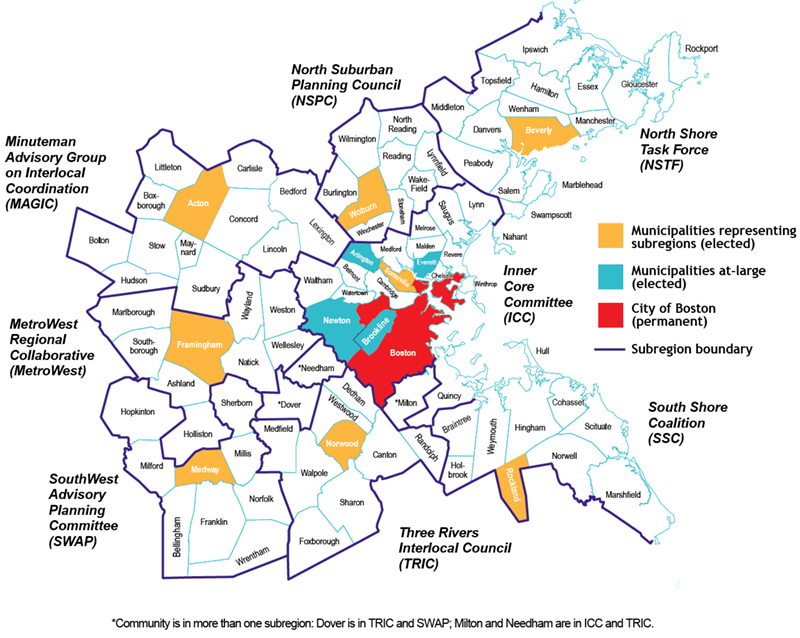
The Boston Region MPO firmly believes that meaningful public engagement is integral to the organization’s transportation planning work. Public engagement improves decision-making by helping to illuminate the social, economic, and environmental benefits and drawbacks of transportation decisions and by supporting a continuous feedback loop in ever changing circumstances.
Who makes up the Boston Region MPO board?

The Boston Region MPO’s planning area encompasses 97 municipalities and approximately 1,360 square miles stretching from Boston to Ipswich in the north, Marshfield in the south, and to approximately Interstate 495 in the west. It is home to more than three million people and supports more than two million jobs.
The MPO board is made up of 24 state, regional, municipal, and council members who work cooperatively to make decisions about regional planning and funding priorities. Municipal representatives are elected every three years on a rolling basis. The City of Boston has two permanent seats. Along with representatives from municipalities across the region, there are five permanent seats for transportation agencies including MassDOT, MBTA, and MassPort. The Metropolitan Area Planning Council (MAPC), the MBTA Advisory Board, and the MPO’s Advisory Council also have permanent seats. Visit the Boston Region MPO website to see the most up-to-date Boston Region MPO Board list.
Questions, comments, thoughts? Reach out to MPO staff:
Public Engagement Coordinator
publicinfo@ctps.org, 857.702.3658
What is the purpose of MPOs?

Congress created MPOs to promote cooperation among state agencies, organizations, and local cities and towns that are involved in regional transportation planning. The elected MPO board is charged with deciding how to spend a portion of federal transportation money for the region on transportation studies conducted by MPO staff and construction projects. The board must also approve all federal transportation funds used in the region, which includes funding for transit, roadway, bicycle, and pedestrian projects. MPO funding is established through federal transportation legislation, the most recent of which is the Fixing America’s Surface Transportation (FAST) Act of 2015.
The Boston Region MPO carries out seven core functions
- Establish and manage a fair and impartial setting for effective regional decision-making in the Boston region
- Evaluate potential improvements to the transportation system in the Boston region and study regionally significant transportation issues through the Unified Planning Work Program (UPWP)
- Prepare and maintain a Long-Range Transportation Plan (LRTP) for the Boston region, with a minimum of a 20-year horizon that establishes the MPO’s transportation vision, goal areas, and objectives; establishes investment programs; and plans major transportation investments
- Develop a five-year Transportation Improvement Program (TIP) annually describing transportation projects funded in each investment program to fulfill the goals of the LRTP
- Engage the public by offering all interested persons opportunities to engage in all the decision-making functions of the MPO through the Public Engagement Program (PEP)
- Ensure compliance with federal and state civil rights and nondiscrimination requirements through the Transportation Equity Program, and invest in transportation projects and studies that improve access, mobility, safety, and other outcomes for underserved groups while minimizing harmful burdens
- Conduct Performance-Based Planning by establishing targets and evaluating the impact of MPO actions
How can you get involved?

- Attend MPO and MPO Committee meetings (in person or virtually) where you can see the process in action and provide or submit your comments
- Participate in informational sessions, workshops, and forums hosted by MPO staff on MPO plans and studies
- Take MPO surveys on specific projects, plans, and initiatives to shape research and policies
- Join the Regional Transportation Advisory Council (Advisory Council) or other MPO working groups and task forces
- Invite MPO staff to your organization’s meeting or event to present MPO research and programs or listen to community members share their transportation needs
- Hold the MPO accountable to develop transportation planning processes that involve everyone, including those who have been underserved and lacked access to the decision-making process
- Subscribe to MPO emails and follow @BostonRegionMPO on Twitter, Instagram, Facebook, and LinkedIn
- Watch MPO meetings and recorded MPO engagement events on the Boston Region MPO YouTube channel
- Provide public comment on the Transportation Improvement Program (TIP) to help the MPO board decide what projects to fund
- Suggest study ideas for the Unified Planning Work Program (UPWP) on regional transportation issues and priorities
- Engage in the development of the vision, goals, objectives, scenarios, and strategies for the Long-Range Transportation Plan (LRTP)
- Provide feedback on the performance criteria and targets the MPO establishes to evaluate plans and investments
The Advisory Council
The Advisory Council is an independent body that brings public viewpoints and advice on transportation planning to the Boston Region MPO. Its membership includes municipalities, professional organizations, transportation advocacy groups, and other state agencies.
The Public Engagement Plan
The MPO’s Public Engagement Plan guides our efforts to make sure everyone has access to the regional transportation planning process. To read more about our guidelines, policies, and requirements read the full plan on the MPO’s website at bostonmpo.org/public_involvement.
What are the MPO’s public engagement principles?
The MPO strives to be open and engaging, and to work together with everyone interested in its programs. The MPO encourages public input in all aspects of its decision-making. The MPO is committed to fostering a robust and inclusive public engagement process for regional transportation planning. The following principles guide the MPO’s efforts in public engagement.
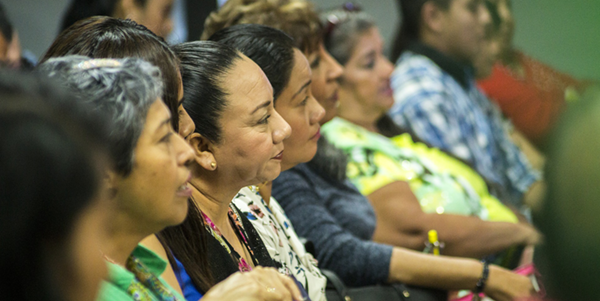
- Transparency: Decision-making processes are accessible, open, honest, and understandable.
- Inclusion and Equity: Dialogue and decision-making processes intentionally identify, reach, and encourage participants from residents, with specific efforts made to engage people of color, people with limited English proficiency, youth, older adults, people with disabilities, and people with low-incomes using creative opportunities, tools, and technologies.
- Early and continuous public involvement opportunities: Community engagement is an early and integral part of design and implementation of regional plans, policies, studies and programs.
- High-quality process: Community engagement processes are well designed to appropriately fit a plan, program, or project, and adapt to changing needs.
- Building relationships with diverse community members: Staff develop long-term, collaborative working relationships and learning opportunities with residents, community organizations, municipalities, and advocacy groups.
- Continuous evaluation and improvement: Engagement staff continually evaluate engagement efforts through quantitative and qualitative measures to enhance the MPO’s practice of public engagement and share public feedback.
Why were MPOs created?
MPOs were in a large part a reaction to the 1950s era of highway building.

Projects, such as the Inner Belt in Massachusetts, would have displaced thousands of people.
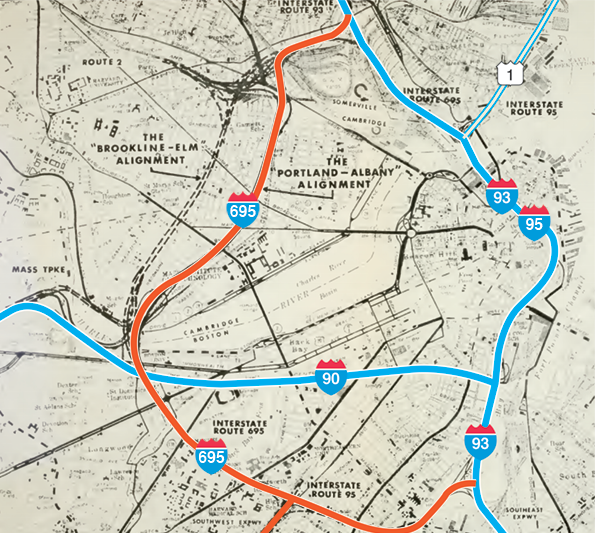
From 1950-70, the “Highway Revolts” challenged conventional highway planning.

In combination with the nation’s environmental movement, and the passage of the federal Clean Air Act, establishment of other air quality regulations, and the creation of the EPA, these advocacy efforts attracted significant political support to the highway revolts.
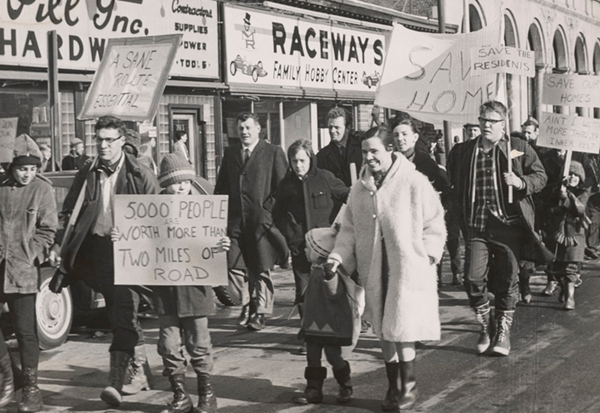
On November 30, 1970, not long after becoming Governor of Massachusetts, Francis Sargent declared a moratorium on highway building inside the Route 128 loop and called for a comprehensive multimodal study of the region’s transportation needs.
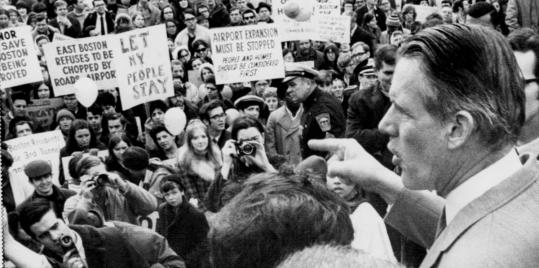
Through the Federal-Aid Highway Act of 1973, Metropolitan Planning Organizations were given the power to authorize the use of federal transportation funds.
For even more about the Boston Region MPO’s history, visit our timeline on the Boston Region MPO website.
For more details on the MPO’s Public Engagement Program
Visit BostonMPO.org/public_involvement.
Thank you for your interest in the Boston Region MPO and the regional transportation planning process!
The Boston Region Metropolitan Planning Organization
10 Park Plaza, Suite 2510
Boston, MA 02116
BostonMPO.org
Welcome. Bem Vinda. Bienvenido. Akeyi. 欢迎. 歡迎. Chào mừng.
You are invited to participate in our transportation planning process, regardless of your race, color, national origin (including limited English proficiency), religion, creed, gender, ancestry, ethnicity, disability, age, sex, sexual orientation, gender identity or expression, veteran’s status, or background. Read our full notice of rights and protections.
To request special accommodations, or if you need this information in another language, contact the MPO at 857.702.3700 (voice), 711 (TTY) or civilrights@ctps.org (please allow 14 days).
|
|
简体中文 (Simplified Chinese)
如果需要使用其它语言了解信息,请联系波士顿大都会规划组织 (Boston Region MPO) 《民权法案》第六章专员,电话 857.702.3700. |
繁體中文 (Traditional Chinese)
如果需要使用其他語言瞭解資訊,請聯繫波士顿大都會規劃組織(Boston Region MPO)《民權法案》第六章專員,電話 857.702.3700. |
|
|
Kreyòl Ayisyen (Haitian Creole)
Si yon moun vle genyen enfòmasyon sa yo nan yon lòt lang, tanpri kontakte Espesyalis Boston Region MPO Title VI la nan nimewo 857.702.3700. |
|
|
Español (Spanish)
Si necesita esta información en otro idioma, por favor contacte la Boston Region MPO al 857.702.3700. |
|
Tiếng Việt (Vietnamese)
Nếu quý vị cần thông tin này bằng một ngôn ngữ khác, vui lòng liên lạc Boston Region MPO theo số 857.702.3700. |
|
|
Português (Portuguese)
Caso estas informações sejam necessárias em outro idioma, por favor, contate o MPO da Região de Boston pelo telefone 857.702.3700. |
|
|
|











